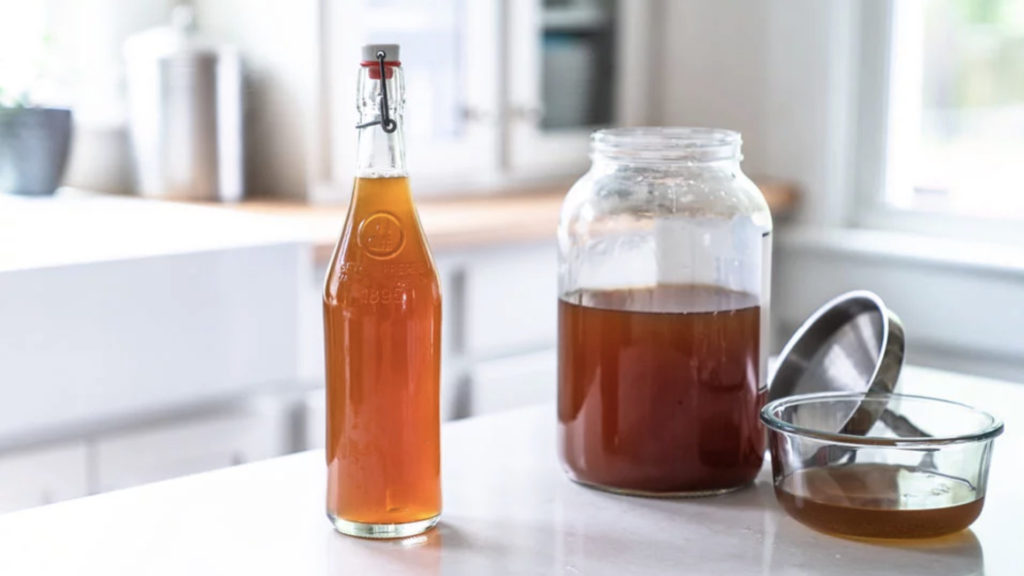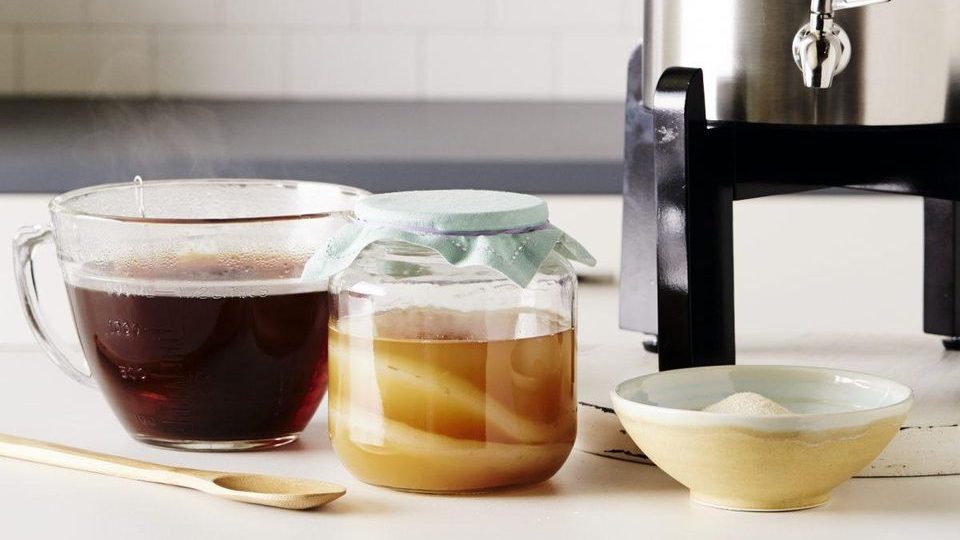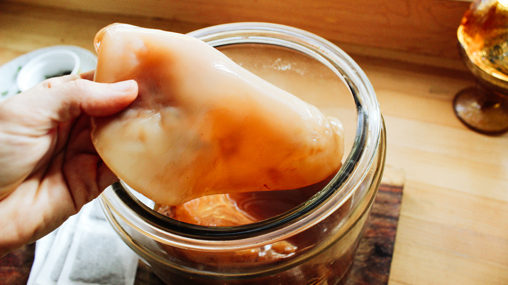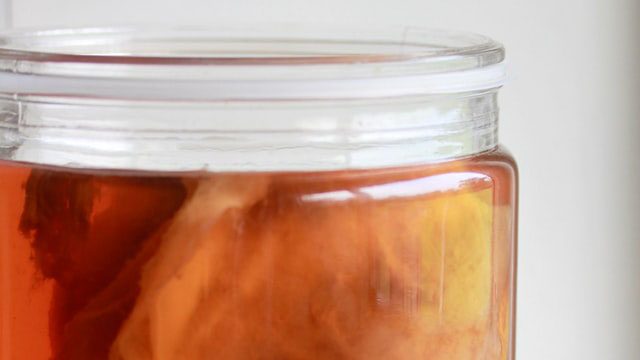All Your Kombucha Needs Solved
– Learn how to make your own Kombucha!
– Get started fast with our equipment guide!
Making Kombucha
Are you ready to learn how to start making kombucha? We created this quick-start guide to help you get brewing some booch as fast as possible. This guide is broken up into three easy-to-follow articles that will take you from starting a new batch of kombucha to enjoying the final bottle of your fizzy…
Kombucha Recipes
DIY kombucha brewing is easy. You don’t have to break the bank and spend hours of hard labor to make it. The great thing about making it yourself is that you can control what goes into your drink and you can experiment with many different flavors..
Kombucha Starter Kits
The only thing I don’t like about kombucha is it can get expensive. That’s why I learned how to make it myself years ago. There is a very fast way to get home brewing started, and that’s with kombucha starter kits..
Our supplies guide take all the thinking out of the equation. All you need to get started fast is here.
SCOBY Kombucha
Ever wondered what SCOBY (symbiotic culture of bacteria and yeast) is? How to make a SCOBY or how to store SCOBY? Everything you need is here in this comprehensive guide.
Our Latest Articles
The Best Kombucha Recipe On the Internet
The Best kombucha recipe on the internet To DIY kombucha is easy. You don’t have to break the bank and spend hours…
Kombucha Health Benefits
Benefits of drinking Kombucha. Looking for something to drink that science shows as good for the gut, the brain, your blood sugar, and so much more?
Top 10 Mistakes Kombucha Brewers Make
top 10 mistakes kombucha brewers make Hi! Steve here – the founder of MakeBooch.com. During this article, I am going to share…
How to Make Your Own Kombucha SCOBY
how to make your own kombucha scoby Some people may think SCOBYs look gross, but they are an important part of brewing…
Homemade Kombucha
Over the last decade or so, kombucha has become a mainstream health-promoting drink. This fermented probiotic tea has been visible on grocery shelves and on tap at trendy bars and restaurants.
But, it does not come cheap. However, you can easily prepare your homemade kombucha.
What Is Kombucha?
When people refer to kombucha, the thing that comes to mind is the gelatinous culture of bacteria and yeast.
However, we will refer to kombucha as the brew or tea you can drink.
Kombucha is a fermented sweet-sour fizzy drink made with black tea (the best tea for kombucha), water, and sugar. Fermentation results in a liquid brew and a gelatinous culture called SCOBY.
What Is a Kombucha SCOBY?
SCOBY is just an acronym that stands for “symbiotic culture of bacteria and yeast”.
Sounds complicated, right.
Let’s make it simple to define each word. Symbiotic means “an interface or contact between two live organisms. Culture means the act of cultivating (like in bacteria) living organisms into a prepared nutrient media. Bacteria and yeast need not be defined because you know what those are.
Now we know SCOBY is bacteria and yeast combined and cultivated in an environment where they can grow and evolve; fueled by sugar.
Sugar is a critical ingredient in making Kombucha SCOBY
Kombucha Benefits and Side Effects
One of Kombucha’s main ingredients is black tea, which comes from the same plant as green tea.
Since it comes from the same plant as green tea, kombucha also carries the health benefits derived from green tea.
- Rich in antioxidants. Green tea is rich in bioactive compound like polyphenols, which serves as a powerful antioxidant.
- Green tea benefits. Studies showed that consuming green tea regularly could help control blood sugar levels, increase calorie burn, reduce body fats, and improve cholesterol levels.
- Reduce the risk of cancer. Another study showed it could help reduce the risk of breast cancer, prostate cancer, and colon cancer.
- A possible source of probiotics. A study showed kombucha contains lactic-acid bacteria with possible probiotic functions. Kombucha probiotics provide the gut with healthy bacteria.
Every benefit has a corresponding side effect. Here are a few kombucha side effects.
- The bacteria growth in kombucha can be harmful due to the development of mold when not properly prepared.
- May cause lactic acidosis due to the build-up of lactic acid.
- Possible interaction with disulfiram (alcohol dependence medication) due to alcohol content in kombucha
- Not safe to drink by breastfeeding and pregnant women, those with alcohol problems, and those with a weak immune system.
Making Homemade Kombucha
You can buy kombucha from grocery stores but if you want to keep a stock of kombucha, the best way is to make your own.
Making homemade kombucha will not just save you money (because it’s way cheaper); you will also be assured that it is safe and clean.
Here at Make Booch we walk you through how to make kombucha in the comfort of your own home! Have a look around the site for a ton more information.
Below is a basic guide. Find our full guides here.
Preparing Materials and Ingredients – List of recommendations found here.
First is preparing your materials and ingredients.
Materials:
- 1 gallon-sized jar – sterilized
- Coffee filter or fabric (or any breathable cover) secured by a rubber band
- pH tester to test the acidity of the kombucha
- Tea infuser only if you are using loose tea leaves instead of tea bags
- Temperature strips to monitor the jar temperature.
- Live starter culture is needed if this is your first time making a kombucha SCOBY
Making a SCOBY
If you already have a kombucha brewing kit, you can skip making the SCOBY.
But since we are assuming this is your first time making kombucha, we will teach you how to make your own SCOBY.
SCOBY Ingredients:
- 7 cups of non-chlorinated filtered water
- 4 bags of black tea (or 1 tablespoon loose leaf tea)
- ½ cup granulated plain white sugar
- 1 cup plain kombucha – this is store-bought or you can ask a friend who makes kombucha. Your SCOBY starter kit should include a cup of liquid that you can use.
Directions:
- Boil 2 cups of the non-chlorinated water in a large-sized pot.
- Remove the water from the pot and steep the tea bags for 5 to 10 minutes.
- Add the sugar and stir until completely dissolved.
- Let your tea mixture cool then transfer to your 1-gallon jar. Add the remaining filtered water to your jar.
- Add the kombucha.
- Cover the jar with a breathable cover (filter or cloth) and secure it with the rubber band. Place in a dark room and keep the temperature of the jar between 75 to 80 degrees.
- It would take about 4 weeks for the SCOBY to form. You can check the jar every week to see how it progresses. Once your SCOBY turns into an opaque ¼-inch layer, you are ready to make your kombucha.
- Lift out your SCOBY and save 2 cups of the liquid for use in your kombucha tea. Discard the rest of the liquid. The next step is fermentation.
First Fermentation
Ingredients:
- 14 cups of non-chlorinated filtered water
- 8 bags of black tea
- 2 cups of kombucha with SCOBY (this is the liquid you reserved from making the SCOBY)
Directions:
- Repeat Steps 1 to 5 on how you made the SCOBY.
- With a clean hand, gently lift the SCOBY and place it inside the jar.
- Repeat Step 6 above.
- Start to ferment for 7 – 21 days. You can start tasting after 6 days. Continue to ferment until it reaches your desired sweetness and acidity. The normal pH of a good fermentation is between 2.5 to 3.5 pH.
- Save 2 cups of the fermented brew and the SCOBY for your next batch of brew.
Second Fermentation
Kombucha second fermentation is just a continuation of the first.
- Pour your fermented kombucha into airtight bottles (you should have a yield of 16 cups).
- Add flavoring and if you want it sweeter, add extra sweetener.
- Seal the bottles and ferment them for 3 to 10 days in a dark room. Once it reaches your desired carbonation, refrigerate.
This is how easy it is to prepare.
This easy kombucha recipe is a tea recipe and may contain a small amount of alcohol.
You can also make hard (alcoholic) kombucha, but that is another story to tell.
Please have a look around the site, we have general articles, recipes, equipment guides, starter kits and brewing guides to teach you all you need to know about kombucha 🙂








